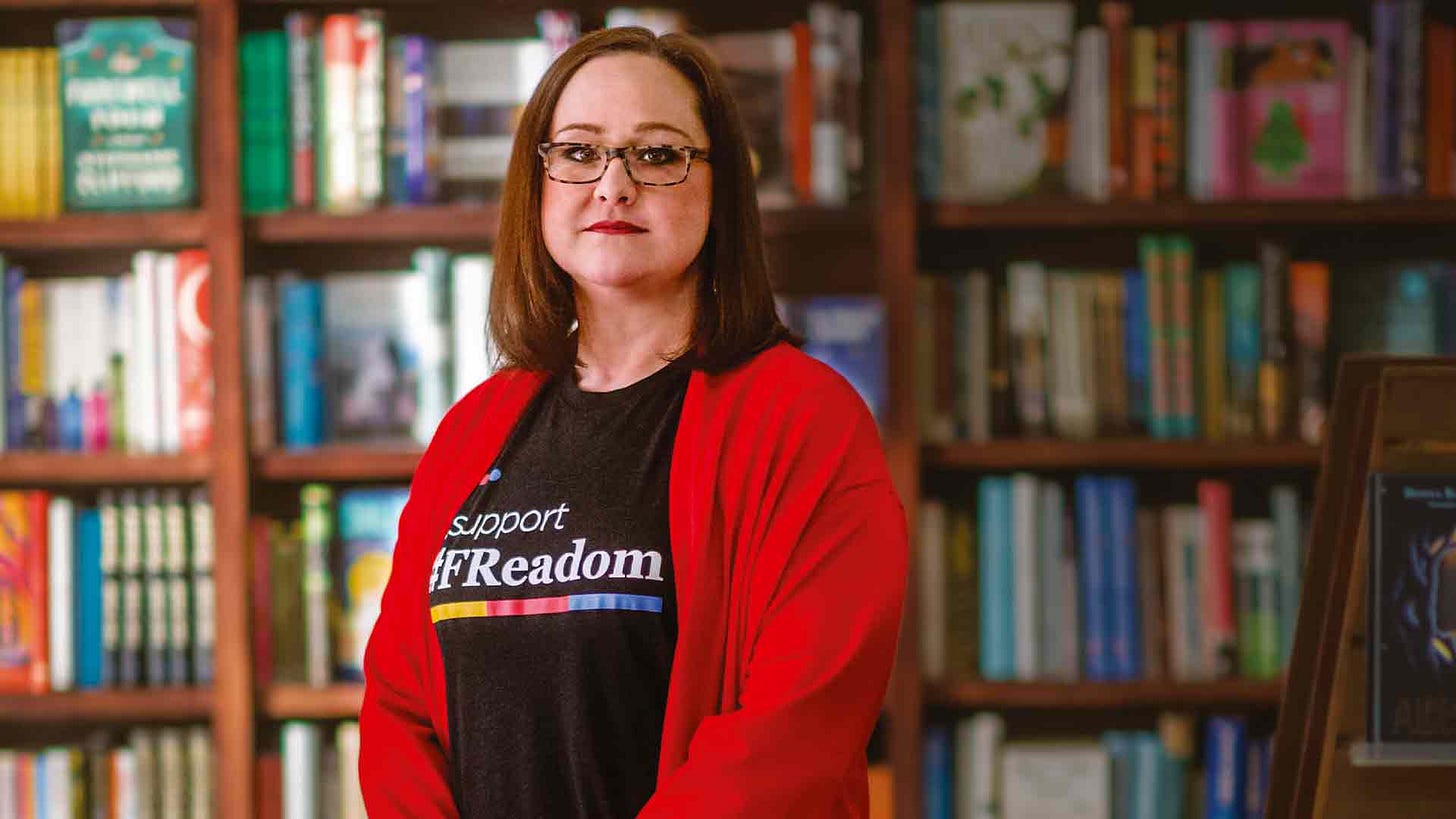Reading as Rebellion
Some Recommendations and a Proposed Second Book Club Focusing on Banned Books
Hello bluestockings.
To celebrate Women’s History month, I am offering a 30% discount on all subscriptions that is good for one year. Click on the button below to become a new paid supporter or upgrade your subscription.

We must rebel through words and art.
called on us to rebel instead of resist. Now is the time to go full punk rock against the system, fascism and the Mump-Nazi Reich. One way to do this is read the books it doesn’t want us to.A few months ago I recommended some books to read before the November 5 election. I have copied and shared them from my original post and included some new titles.
Below these recommendations, I have included another poll for a second book club. This book club would focus on reading banned or challenged books. Based on the response and my schedule, I am thinking of launching it either during the summer or in the fall.
Reading and Viewing Recommendations
1984 by George Orwell (novel)
I first read 1984 in high school as I am sure many of you did. Some of you may have read it in middle school.
Orwell used the brutal censorship and violence from the Soviet Union and Nazi Germany to create his narrative’s dystopian and autocratic future.
A close and careful read of 1984 should disturb all readers. The parallels to today teach lessons that we can apply to what we consume in mass media, including social media, and how we choose our candidates in local, state and federal elections.
David Bowie used 1984 as inspiration for his album Diamond Dogs. He originally wanted to write 1984 as a rock opera, but Orwell’s widow Sonia did not grant Bowie permission to do so.
Parable of the Sower by Octavia Butler (novel)
Told in journal entries, Butler’s protagonist Lauren Oya Olamina narrates her journey in a dystopian world destroyed by wealth and racial inequality and climate change. After her own community’s destruction, the hyper-sensitive and hyper-empath Olamina leaves. During her odyssey, others join her in creating a new ethos and community through her new religion called Earthseed.
Published in 1993, Butler begins her speculative novel in 2024. Butler’s work is not only prescient but a warning of what will develop if the United States and the world do not alter their current trajectory toward self-destruction.
The Last Man by Mary Shelley (novel)
Like Butler’s novel, Mary Shelley’s 1826 novel published eight years after Frankenstein is eerily prescient. Set in the late 21st century, a plague pandemic devastates the world and extinguishes mankind.
The novel found new readers during the Covid-19 pandemic. With an anti-vaccine advocate heading the U.S. Department of Health and Human Services and Useful Idiot Krasnov pulling the United States out of WHO and decimating the CDC, Shelley’s narrative reminds us mankind its institutions fragility.
The Handmaid’s Tale by Margaret Atwood
Margaret Atwood’s speculative novel that has faced countless challenges and banning serves as warning like Butler’s and Shelley’s fiction. Narrated by the character Offred and set in the Republic of Gilead, which has replaced the United States, Atwood creates a sickening country where women have no agency and a segment of them are only used as reproductive vessels.
It Can't Happen Here (novel)
Published in 1935, Nobel and Pulitzer Prize-winning American author Sinclair Lewis's speculative novel imagines the United States embracing fascism and electing an autocrat who suspends civil rights and liberties. Chills anyone?
The Plot Against America (novel and limited series)
The late Philip Roth's novel presents an alternate U.S. history that has the U.S. electing the popular aviator, Nazi sympathizer, America First supporter and anti-Semite Charles Lindberg as U.S. President during World War II. What results is an even more broken America that targets, terrorizes and oppresses its Jewish population. HBO adapted the narrative into a limited series in 2020.
Look Who's Back (novel and film)
Think Hitler committed suicide in the bunker and is now erased from mankind? Think again. Fascism, Nazism, strongmen and autocracy never go away if we don't extinguish them. Timur Vermes 2012 novel, which is often funny as it is terrifying, was adapted into a 2015 film that for now can still be watched on YouTube.
On Tyranny (non-fiction handbook)
I wrote my book review of historian Timothy Snyder’s necessary handbook last February. You can read my review here.
In his concise text, Snyder provides 20 lessons from history and shows what we can do to stay aware of rising autocracy and preserve democracy.
They Thought They Were Free (non-fiction history)
Former Associated Press journalist Milton Mayer interviewed 10 lower middle-class German men who were pro-Nazi during Hitler’s totalitarian reich. With Mayer, they shared the men’s still positive memories of Nazism and living under Hitler’s version of Hell. The 1955 book remains in print; new readers will discover how easy it is to be taken in by autocracy if a person is vulnerable, empty, insecure or bitter about their situation in life.
The Rise and Fall of the Third Reich (non-fiction history)
William L. Shirer as a Chicago Tribune and CBS correspondent reported from Germany as Hitler rose to power, during World War II and during The Nuremberg Trials. Shirer’s takes a granular view of The Nazis’ rise and collapse. exposing how fragile democracy is if people are not active and don’t critically think.
The Origins of Totalitarianism (non-fiction history and philosophy)
German-American philosopher and intellectual Hannah Arendt, a Holocaust survivor, examines the roles anti-Semitism, imperialism and racism play in forming totalitarian regimes. Throughout her life, Arendt stridently supported pluralism and people utilizing their ability to critically think in order to question and confront oppression and autocratic politicians and leaders.
Patriot (memoir)
The late Alexei Navalny's memoir about his life and his fight for Russian democracy was published last year. He began working on it after surviving his first Putin-backed assassination attempt and continued his autobiography from prison.
Banned Book Club?

After this week, I began thinking of starting a second book club that would focus on just banned or challenged books. Depending on the response, I am thinking of launching it either this summer along with our Feminist Book Club’s second title Know My Name by Chanel Miller or in the fall.

















